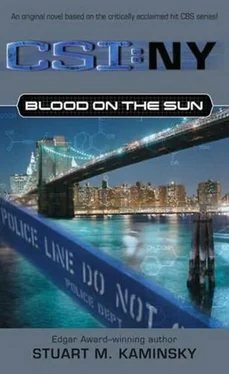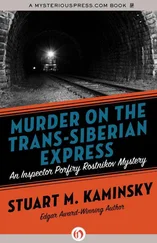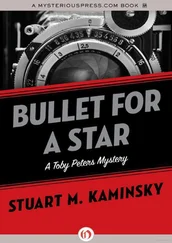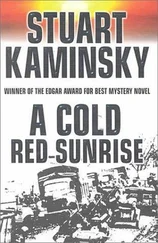* * *
At six a.m. Joshua was found in his holding cell by a guard bringing breakfast. Joshua sat still on his cot, palms out, both deeply gashed. Blood drenched the cot and formed a small dark lake on the floor. Joshua's face was white.
The guard, a man named Michael Molton who had twenty-two years of service, put the tray on the floor, called out for help and moved to find something with which he could stop the bleeding. It was only when Adams was bent over and pressing the part of the blanket that wasn't covered with blood against the wounds that he looked down at Joshua's bare feet in a second pool of blood. Both feet also bore gashes like the ones in his palms. On the floor near the cot, the guard saw a bloody piece of rusted metal about the size of a cell phone.
Molton thought he had seen everything, but this was a new one. And, he thought, the day is just starting.
It was six minutes past six in the morning.
"THEY LOOK LIKE MOB HITS," said Hawkes, his eyes moving between the two sheet-covered dead men on the tables in front of him. They were turned facedown. "But whoever did it is even better than a mob hit man."
Aiden watched as Hawkes leaned over the body of Asher Glick.
"Two shots,.40 caliber fired from no more than an inch away," Hawkes said. "Found the bullets in the flesh under the tongue, less than half an inch apart. The other one…"
He pointed at the body of Besser.
"Same thing. Bullets from the same gun fired about an inch away. Bullets found lodged in the skull over the right temple about an inch apart."
An examination of the bullets from the victims identified them as.40 caliber Smith & Wessons. They were looking for a pistol, one that could fit in a pocket. They were also looking for a semiautomatic, which would allow the killer to get off two shots quickly. Aiden knew there were pistols no more than five and a half inches long and weighing twenty-two ounces. Aiden told Hawkes.
"Indeed," said Hawkes, "but there was something interesting, which was why I left you the message."
Aiden's eyes were fixed on him.
"Victim one, Glick," said Hawkes, "was standing when he was shot."
"Blood trail a little over three feet from where he fell or was placed," she confirmed.
"Right," said Hawkes. "Victim two was seated."
"Blood spatter on the chair he was sitting in," she said.
"Checked the angle of entry again," said Hawkes. "This time assuming we were dealing with a pro. If he held the gun something like this…"
Hawkes stood straight up, hand out as if he were a kid playing war, aimed at Aiden.
"Pretty much standard position," he said.
Aiden agreed.
Hawkes nodded and said, "Your shooter is about six feet four inches tall. Given the angle of the entry on both victims, I got a dummies and put a gun in its hand. Then I found dummies the same height as the two victims."
"And," said Aiden, "given the angle of entry, if the shooter was standing, he had to be tall."
"Six-four is close," said Hawkes. "Got any suspects that tall?"
"Indeed we do," said Aiden.
"Coffee?" asked Hawkes.
"No time," said Aiden. "Later maybe."
"I've got to get Glick's body to the widow today," said Hawkes. "If I don't, there'll be a protest in front of the mayor's office before the day is over."
Aiden headed back to the lab and the computer, but there were some things the Internet probably couldn't tell her. She would have to make some calls.
* * *
Mac sat at his desk. He had calls to make too.
He had reluctantly returned Rufus to the dog unit.
Now he sat in front of the screen of his computer, where he had read Danny's e-mail about Kyle Shelton's web site and blog. Mac was looking for what he could find on Shelton's blog. There had been no entry the day before.
It was too early to call the college, but he tried anyway and got through the recorded message to a human being in student housing. Her name was Tara Abbott. She sounded sprightly and asked Mac a few questions to verify who he was. She took his phone number and said she would call him back instantly. She did. She wanted to confirm that he was a police officer.
"How long do you keep housing records?" he asked.
"Forever," she said. "We've got them on disks now, going back to the founding of the college in 1934."
"Can you find a student named Kyle Shelton?" Mac asked. "Probably there about five years ago?"
"I can and will," she said.
* * *
Joshua looked dead to Flack, but there the man lay in bed, hands and feet bandaged, blood drained from his face. He was covered by a sheet and blanket, an IV pole and bag next to him.
"Can you hear me?" asked Flack.
No answer.
"Can you hear me?" he repeated, leaning closer to Joshua, whose thin breath touched Flack's face.
Flack was about to give up when Joshua's eyes fluttered and opened in a squint as if blinded by the light, but the light was dim and the window shade was down. A brownish muted light filtered through the shade.
Joshua blinked, looked around without moving his head and his eyes found the detective.
"Water," Joshua gasped.
Flack got the slightly dusty glass from the table. A straw protruded from the water. Joshua took a long sip and gagged. Flack put the water back on the table.
"You want a lawyer?" asked Flack.
"No. I want to die, wanted to die," rasped Joshua. "Only now, I'm afraid."
"Of who?"
"Of what. Of dying. Last night in that cell I lost my faith," said Joshua with a cough. "Is what I did in the newspapers? On the radio?"
"It will be," said Flack.
Joshua sighed.
"I've lost my faith, my congregation, what little reputation I had. Everyone will find out about my drinking. 'Messianic Jewish leader crucifies two Jews, caught while he was about to do the same to a Catholic priest. Attempts to crucify himself in prison.' That's a summary, not a headline."
"Did you kill those men?" Flack asked.
"No. I thought the priest had done it," Joshua said. "The phone call…"
His voice trailed off.
"Hispanic accent?" asked Flack, remembering the drawing by Sak Pyon of an Hispanic man.
Joshua tried to nod, but the movement caused pain that was clearly, instantly frozen on his face.
"More water?" asked Flack.
"No," said Joshua.
Flack said nothing as he sat looking at the man, who was breathing hard from the effort of talking.
Flack would not say it. His job wasn't to go on hunches and intuition, but to come up with evidence, find suspects. He thought Joshua was innocent of murder. He may have been guilty of many other things, but not these murders. Prejudice had crept in. Flack didn't like it.
His cell phone vibrated in his pocket. Flack took it out, flipped it open.
"Yes?" said Flack.
"Is he going to pull through?" asked Stella.
"Looks that way," said Flack, looking at Joshua, whose eyes were again closed. "Says he didn't do the murders."
"Probably didn't," said Stella. "Step into the hall."
Flack assumed Stella had something private to say, something she did not want Joshua to hear Flack's response to. He moved to the door and stepped out. Stella stood there, closing her phone and putting it in her pocket.
Stella had spent the last two hours with Melvoy in a room on the floor below Joshua's. Melvoy was going to live, but there was a price to pay. His voice would forever be a rasp and his mouth would be almost painfully dry. He would have to carry a bottle of water everywhere he went. With Alzheimer's taking over his mind, he would almost certainly forget to drink the water.
"What am I being charged with?" Melvoy had whispered when he saw Stella. Talking hurt, whispering didn't, but he knew it was hard for Stella to hear him.
Читать дальше












